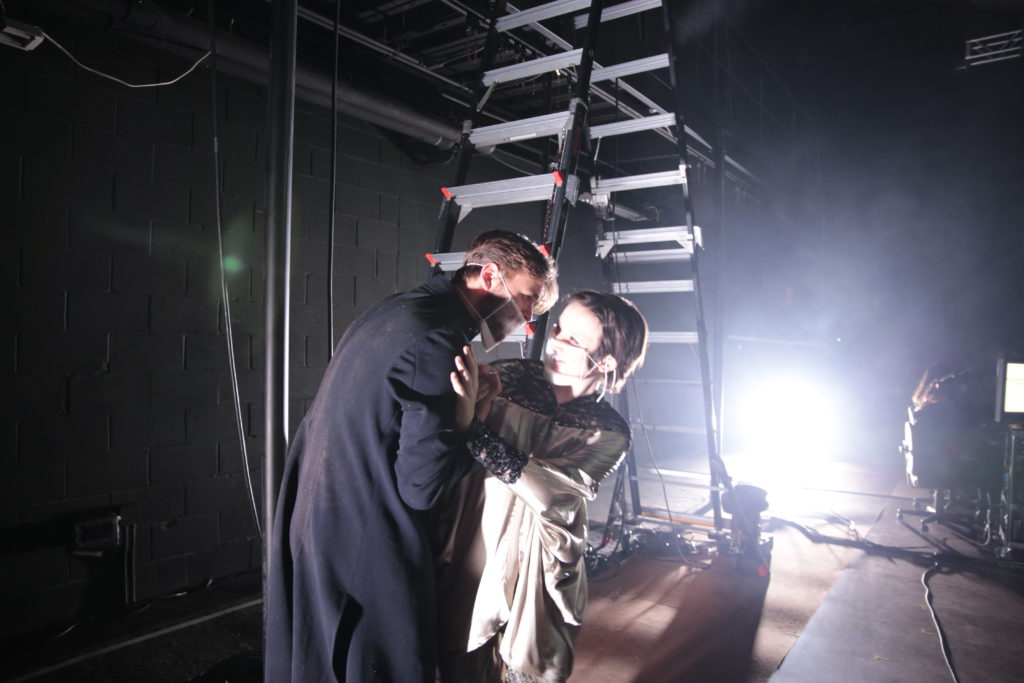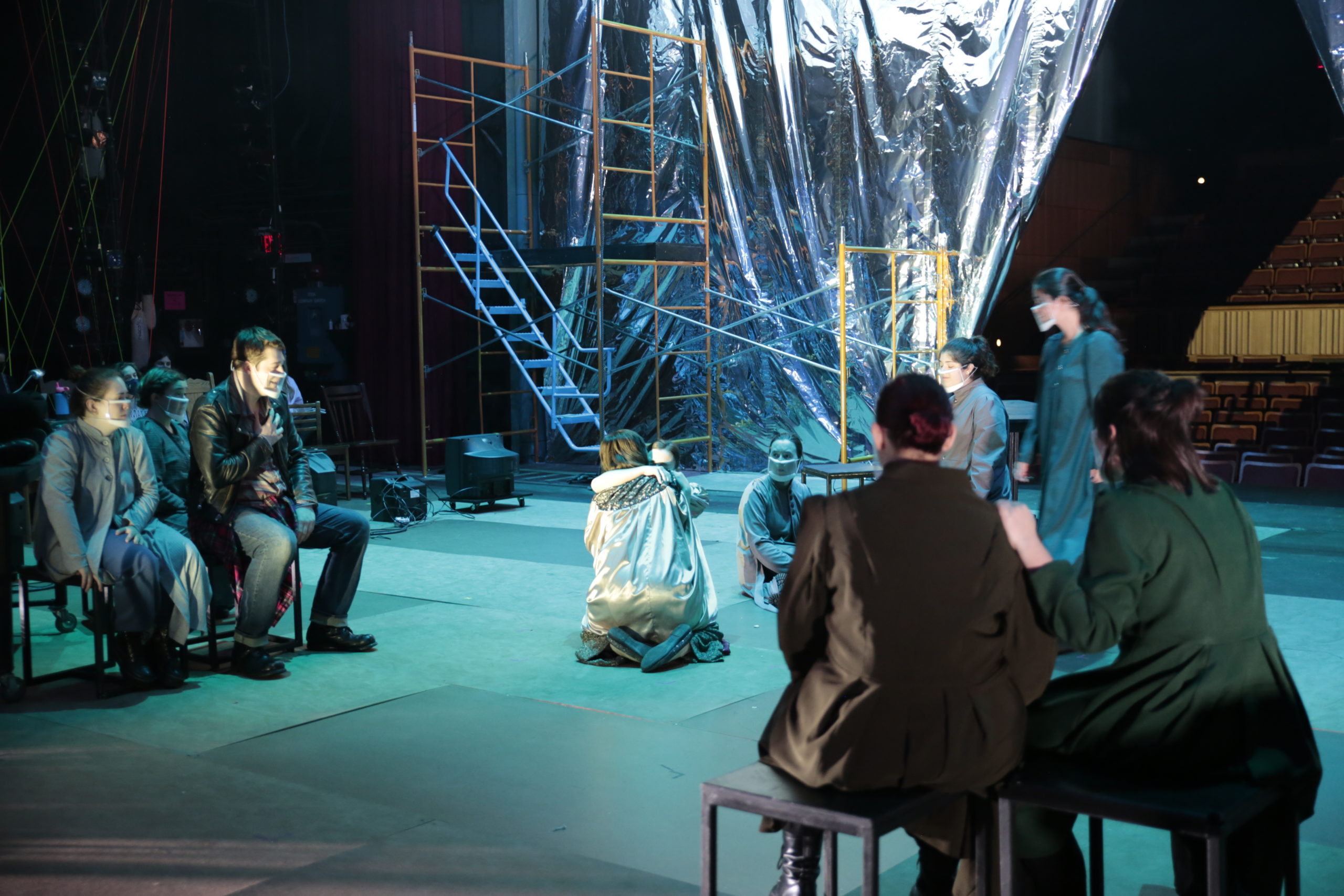By Sarah Nicell || Campus Life Editor

The Winter’s Tale—a famously bizarre play by William Shakespeare—tells the story of King Leontes, a “jealous tyrant” who accuses his pregnant wife, Hermione, of having an affair with his childhood best friend. These allegations lead to the death of both Hermione and his only son, Mamillius, as well as the abandonment of his newborn child and the devouring of a man named Antigonus by a bear (I cannot explain this plot with a word limit and without a theatre degree). Despite these tragedies being entirely his fault, Leontes proceeds to grieve and sulk for decades. By the end of the play, Leontes is undeniably the worst. He sucks. The audience hates the guy.
In a sudden and unexpected turn of events, the seemingly irredeemable King is reunited with his lost child, and his wife is resurrected by random magical powers. He does not get his comeuppance. The trio exit the stage as a family. After twenty years of grief, Leontes is rewarded with forgiveness.
Although Shakespeare was happy to cut the King of Sicilia some slack, Rachel Anderson-Rabern was not.
So she didn’t.
On Halloween weekend, the cast and crew of Franklin & Marshall TND’s The Winter’s Tale performed in the Roschel Performing Arts Center for limited audiences (very limited—40 people per show). Everyone involved worked diligently through September and October, with some being called to rehearsal five days a week for up to four hours at a time, even prior to dress rehearsals. If you have ever read a Shakespeare play, you know that understanding its contents is a very difficult task. Even more difficult is getting your audience to understand what is going on. Why does Antigonus get eaten by a bear? Why is King Leontes doing sit-ups during his period of grief? Why is an actor singing “Money, Money, Money” by ABBA in a Shakespearean work?
Aside from seating the audience on stage, having a thieving character named Autolycus steal a Jenga set and sing “Bad Romance” by Lady Gaga and “Ave Maria” by Franz Schubert, and making condoms, Viagra, and dildos integral to Act IV, the most important change to the original script is certainly its segue from forgiveness to feminism. After Hermione is brought back to life, the script stays mostly true to its origins, but one key change shifts the message of the entire play.
“She embraces him,” says Polixenes of Hermione and Leontes upon her revival. Polixenes is the King of Bohemia, Leontes’s childhood best friend whom he accused of sleeping with Hermione.
“She hangs about his neck,” offers Camilla, a nobleman of Sicilia.
In reality, she does neither. Instead, Hermione pushes away the desperate, ravenous embrace of Leontes, a man she has not seen in twenty years, a man who has taken her life and child, a man who did not believe her. Instead, Hermione approaches her daughter. She hugs her. She does not let her go. And when Leontes finally extends his arm toward his family, together at last, they both walk away.

He is left on stage alone.
“This ending is a heart-wrenching depiction of justice being served,” says Ellie Borghi, who played both Cleomenes and Mopsa in F&M’s production. “Hermione does not forgive Leontes for all he did to her and the main male character does not get his happily ever after.”
In Anderson-Rabern’s production, forgiveness is not always necessary. And when you do forgive, it’s alright to walk away.
“I think what stands out to me about the text of The Winter’s Tale is that Hermione has remarkably little agency over her own fate, from the beginning of the play where she is wrongfully arrested and berated to the end where she is reunited with the world of the living,” says Tess Wyrick, the actor who portrayed Hermione. “It is Polixenes and Camilla who describe her clinging to Leontes and hanging about his neck, Leontes who describes the warmth of her hands, while Hermione addresses no one but her innocent daughter… It tells a powerful story of how the abuse of a woman can be looked over and forgiven by those who were removed from it even in the slightest, while returning Hermione’s agency to herself as she rejects her husband in favor of the daughter he separated her from sixteen years ago.”
Tess played Hermione beautifully. Despite being resuscitated in an effort to satisfy Leontes, their Hermione can hardly look at the King. Receiving his touch feels wrong—the audience can see her discomfort in her shrug-aways and troubled glances and urgency for something else. The only thing right after such an act is the embrace of her daughter. It’s the only thing Hermione can control, the only desire that she has the opportunity to satisfy. So she does.
“I felt that by choosing to make the ending about Hermione’s autonomy and her relationship with Perdita instead of a reconciliation with Leontes, the show didn’t end with the message that anything is forgivable,” explains Shoshana Frank, who played the musician and impressively understudied every role the show required. “Instead it focused on growing and healing from trauma with the people you love and care about.”
Shoshana also mentioned the pivotal final moment of the show: after his wife and daughter exit without him, Leontes looks up to face the silhouettes of those he killed. Mamillius stands with Antigonus, faces blank but focused on the King. The play ends with Leontes, forced to confront his mistakes in solitude.
“By ending with the spotlight on the two characters who remain dead at the end, the audience is reminded that, due to the repercussions of one person’s actions, others are not able to heal and grow,” Shoshana interpreted, and she is correct. We cannot forgive Leontes because some things cannot be fixed. Even if Hermione is brought back to life, even if some are given a second chance, others are not.
By refusing to provide Leontes with the comfort his reunited family could provide, Anderson-Rabern communicates the message that it is not a woman’s job to forgive toxic men. The King still has some retrospection left to do, and even then, a traumatized wife owes no husband her time, energy, and love.
A Brief Interview with Director Rachel Anderson-Rabern:
SN: What made you want to change Leontes’s ending?
I love Shakespeare, but find my enthusiasm for his poetics degrades in the face of many of his gendered dramatic moments. There were so many things I appreciated about The Winter’s Tale from the outset: the impossible stage directions (“exit pursued by a bear”), the celebration of theatricality and magic, the surreality of two genres spliced together. I did not love the final scene, especially the scant apology from Leontes to Hermione that seemed to erase his toxicity and abuse. I did not love that, in that scene, Shakespeare’s play seemed to forget the lives lost for no reason other than to appease a narcissistic ruler. I enjoyed the “what if,” imagining that perhaps our production could offer a little more agency to the other characters in the story.
SN: What does this change mean in a feminist framework?
I think, or hope, that it helps the audience to question the value of Leontes’ (paraphrased) words, “I’m sorry.” In Shakespeare’s play, those words enable him to take control of the narrative once again, to pair off characters at his whim and to reunite with his family. In our production, we propose a different reading. What if we remember, instead of forget, the tragedies provoked by a king’s control-driven ego? What if we allow both mother and daughter to find peace and wholeness in their reconnection, without needing to repair Leontes’ violence, or allow him to be a part of their family? What if we let them choose each other instead? I see this as a rejection of the violence Leontes perpetrates, a feminist reconfiguring of a happy ending.
Sarah Nicell is a sophomore and the Campus Life Editor for The College Reporter. Their email is snicell@fandm.edu.
